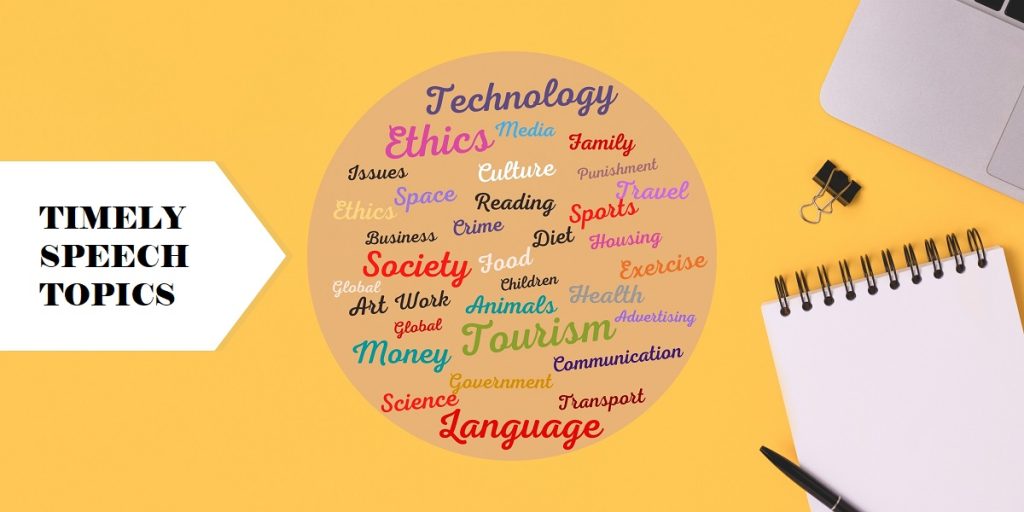Choosing the best informative speech topics depends on your audience. You should choose something relevant for their age group and make sure the language. An informative speech presents facts, not opinions, and is organized logically, so the audience walks away with a good overview of the topic.
When you want to inform your audience on any topic, select an informative speech topic that will appeal to them, pare it down to an appropriate size for the time you have, and prepare the content you will deliver.
What Is An Informative Speech?
Informative speeches present information on a particular topic with the intention of educating the audience. The subject matter should not require interpretation, be subject to dispute, or be based on opinion.
- “Natural disasters are outside of our control and can change the course of people’s lives.”
- “Many who experience domestic violence suffer in silence.”
- “The current public education system doesn’t meet the needs of all students.”
Although simplistic, these are all examples of informative rhetoric based on fact. Whether part of an informative essay or speech, opinions are not involved, and the statements cannot be refuted.
Similarly, an informative speech provides information that educates the audience on an unfamiliar topic without attempting to persuade or convince them.
How Do You Select Topics For An Informative Speech?
Whether you need informative essay topics or topics for informative speech writing, brainstorming is the first step.
Choosing an interesting topic means finding something that’s pertinent and appropriate for your audience, and interesting to you. Then you need to determine which aspect of that topic you want to cover.
Attempting to cover a topic that’s too broad or general is not only a recipe for frustration but will also lead to a speech that’s too long and with little specific value to the audience. So, if human rights are your topic, you’ll need to narrow it down to one particular area of human rights, like human rights challenges in America during the Great Depression.
You must also be careful that your speech is strictly informative and doesn’t cross into the persuasive speech category.

What Makes A Speech Persuasive, Not Informative?
Persuasive speech topics lend themselves to opinions or encourage the audience to believe something that’s not entirely factual. It can be easy to cross the line from informative to persuasive without realizing it’s happened.
For instance, if you’re covering video games, you might be inclined to connect video games to the rise in violence and aggression. While some anecdotal evidence can support this idea, no clear evidence recognized by the American Psychological Association shows a direct and causal relationship between video games and violence.
If your goal is to deliver an informative speech, presenting a connection between video games and violence as a fact would be inaccurate. Attempting to convince your audience that despite the lack of formal recognition of a causal relationship between the two, the anectodical evidence supports the conclusion that one inspires the other means your speech is now persuasive rather than informative.
The point is that when choosing a topic for an informative speech, caution needs to be taken to present factual information that can be supported, is not subject to debate, and is opinion neutral.
Many topics could easily be persuasive topics, even based on circumstantial evidence. Even though you should refrain, for example, from blaming increased violence on video games, you can cite the various concerns and the conclusions from research that has been done if you want to keep the speed informative.
How Do You Find Topics?
Finding topics for an informative speech doesn’t have to be complicated. Almost anything can lend itself to becoming an informative speech topic idea.
As you consider topics, ask yourself the following questions:
- Is it appropriate for the audience?
- Is it interesting to me? Although this isn’t a requirement, the best informative speeches are ones the speaker finds compelling.
- What aspect will I cover?
- Can I cover this topic (or an aspect of the topic) within a reasonable time or within the time limit provided?
What Are 5 Topics For A Speech?
Because informative speeches can address nearly any topic, narrowing things down can feel daunting. Many sites online provide a list of informative speech topic ideas for consideration.

For simplicity, below are some ideas on fun, informative speech topics for a few common areas.
For High School
- Different cultures represented in the Olympics
- Recycling efforts within the school district.
- Ways teachers can improve self-esteem in high school students
- Signs and prevalence of cyberbullying
- Purpose of the United Nations
For College?
- How to obtain and pay back a student loan
- Resources for students with disabilities in college
- Factors influencing climate change
- Mental health in college students
- Positively using social media
For Men?
- Most common phobias in men
- Little-known healthcare resources for men
- The 5 things everyone needs to know about cryptocurrency
- Communication skills for men
- Ways to use social networks to your advantage
For Women?
- Tips for those new to the stock market
- Aging out of the foster care system
- Current uses for artificial intelligence
- Resources for reentering the workplace after having children
- How to balance child rearing and work
For Those Planning A Trip?
- Vaccines required for the 5 most popular destinations
- Best trips for people looking for adventure
- Staying healthy while you travel
- Ways to combat jet-lag
- Best ways to save money when planning a trip
For Cooks?
- Cooking to combat obesity
- Copycat fast food recipes
- The five basic French mother sauces
- Effective and healthy substitutions in cooking
- Breakfast ideas for those too busy to cook
For Dog Lovers
- How to keep your dog’s coat healthy
- Common sicknesses in dogs and their symptoms
- Best dog breeds for apartment living
- Health benefits of owning a dog
- Tips for traveling with your dog
What Are The Types Of Informative Speeches?
Once you’ve decided on a topic, you must determine what kind of informative speech best suits that topic.
Informative speeches fall into four basic categories.
They are:
1. Descriptive speech
A descriptive speech uses factual information to paint the audience a picture of a topic. This type of speech uses clear and vivid language that allows a person to accurately visualize what’s being discussed.
Example of a topic for descriptive speeches: Best trips for people looking for adventure.

2. Explanatory speech
This type of speech will provide new or updated information regarding a process, concept, or issue. It may be an overview of steps or historical evolution of the topic.
Example of a topic for explanatory speeches: Ways teachers can improve self-esteem in high school students.
3. Definition speech
A definitional speech seeks to explain an unfamiliar topic to an audience. Topics appropriately addressed by definitional speeches vary, but the goal of the speech remains the same – providing factual information to an audience that includes historical context and modern relevance.
Example of a topic for definition speeches: Five basic mother sauces.
4. Demonstrative speech
Similar to an explanatory speech, a demonstrative speech may provide step-by-step information. Still, in this case, visual aids are incorporated. Materials utilized will vary depending on the topic. Still, the aim is to provide the audience visual instruction on accomplishing something.
There is disagreement on whether a demonstrative speech is genuinely informative or a category of its own. The claim is that actual informative speech discusses a process without specific how-to information, leaving that territory to the demonstrative speech.
Example of a topic for demonstrative speeches: Current uses for artificial intelligence.

You can address informative speech topics by utilizing one of the styles above.
What Are The 10 Steps In Preparing An Informative Speech?
Effective public speaking requires preparation and organization. When writing an informative the presentation of your subject must be clear, easy to follow, and concise to keep the audience’s attention.
Below are steps that will help you go from concept to delivery of your informative speech.
1. Select a topic
Good informative speech topics will be those that you find exciting or specific topics with which you have real-life experience.
If your topic is broad, narrow it down to the most intriguing or pertinent aspect and focus on that.
2. Research your chosen topic
Regardless of your familiarity, you’ll need to research your chosen topic thoroughly. The more expertise you develop on the subject, the more comfortable you’ll be when delivering your speech.
Focus on areas specific to the aspect you intend to present.
For instance, if your topic is the evolution of electric cars, you could discuss it from a historical perspective, its presence in daily life, or its effect on the environment. But because speeches generally have a time limit, discussing all aspects is likely too much and could be exhausting for your audience.
Instead, focus on a specific area and cover it thoroughly. Be sure that your research utilizes credible sources and the appropriate citations,
which you will verbally reference within your speech. If you use specific information or research done by someone else during your address, failure to cite your source is tantamount to plagiarism.
3. Consider your audience
How you cover your topic, the level of detail, and your delivery will be determined in part by your target audience. Speaking to students in high school, for instance, is different than talking to college students.
4. Develop a thesis statement
Once you’ve researched and have your supporting material, you must develop a thesis statement.
The purpose of the thesis statement is to inform your audience of the topic, aspects of the subject, and the goal of your speech. This sets the direction for your speech and lets the audience know what they should expect to gain by listening.
An attention-getter should precede a strong thesis statement
to pique your audience member’s attention. It can be a tease, story, rhetorical question, or dramatic comment followed by the thesis statement.
You should practice delivering your attention-getter so you present it in a compelling, intriguing, and entertaining way. This will set the tone for what’s to come.
5. Create an outline
Before creating your speech’s body, develop an outline of what you intend to cover. Creating a speech outline will ensure that you have the main points you intend to cover laid out in a way that makes sense and doesn’t overlook anything.
Two types of outlines can help you prepare for your speech – the complete sentence outline and the speaking outline.
The complete sentence outline is helpful as you organize information before writing your speech. The speaking outline is an aid for you when delivering your speech. Both serve important purposes and should be part of your preparation.
6. Write a draft
Once the outline is complete, and the main points are addressed, writing your speech’s draft is the next step.
Your draft should have an introduction, body, and conclusion that pertains to your speech topic’s central idea. More on that is below.
7. Evaluate your tone
When the draft is complete, read it, considering your audience and the tone of your speech. The tone should be appropriate for the audience and suitable for keeping their attention. This means that while the speech should be informative (using an informative tone), how you deliver it may also be humorous, assertive, energetic, and academic. Or it may change from one tone to another, depending upon the aspect you’re covering.
The goal is to maintain the audience’s attention and interest. So, as the speaker, you need to connect and engage personally and not just through the material.
8. Edit
There is no such thing as a final first draft. Editing your speech for tone and clarity will be required. Reading it aloud is one of the best ways to determine what needs editing. Hearing what you’ve written and how it sounds when spoken can illuminate areas you need to rework.
9. Practice
Once you finalize your speech, it’s time to practice not just the words but also your delivery. An effective speech isn’t only about the information you offer but also about how you present it. So, practicing means working on speaking skills like regular eye contact, speech pace, and effective use of pauses.
10. Commit to memory
The final step in preparing your speech is committing it to memory. Being a strong informative speaker or public speaker of any kind means relying minimally on notes and your speaking outline and comfortably delivering the information to the audience.

